Enhancing Client Wellness: Existential & Person-Centered Therapy Guide
VerifiedAdded on 2023/06/12
|10
|1595
|90
Report
AI Summary
This report provides an educational factsheet for mental health professionals, focusing on the practical applications of existential and person-centered therapy to enhance client wellness. It emphasizes the importance of understanding the therapeutic relationship, including its definition, components, and ethical considerations. The report details how these therapies help clients embrace their choices, address anxieties, and reconnect with their inner values. It further discusses the role of the counselor in providing support and fostering self-actualization. The factsheet also touches upon the ethical principles guiding the client-counselor relationship and strategies for strengthening this bond to improve therapeutic outcomes. The document concludes by affirming the validity and reliability of both existential and person-centered therapies in promoting client well-being.

Educational factsheet
Paraphrase This Document
Need a fresh take? Get an instant paraphrase of this document with our AI Paraphraser
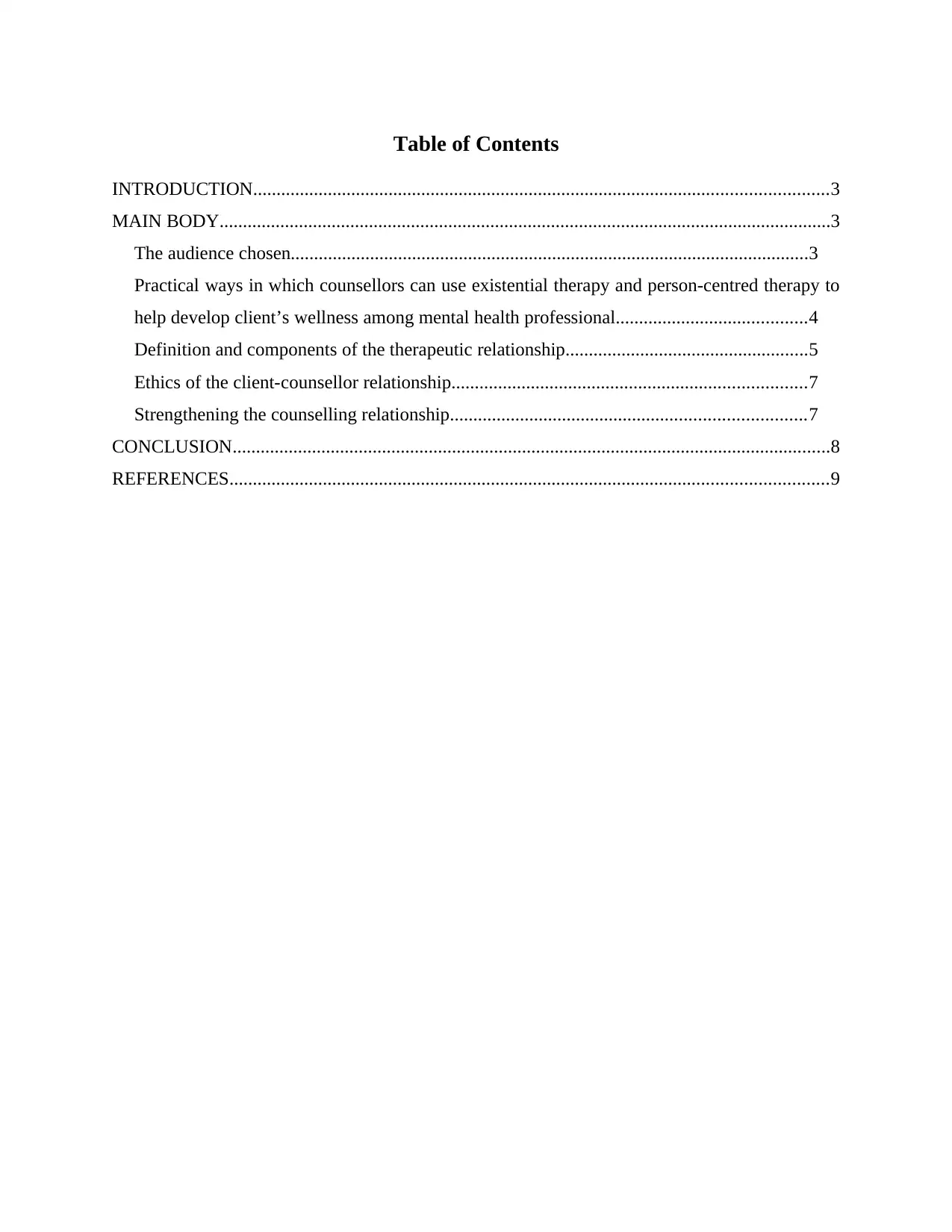
Table of Contents
INTRODUCTION...........................................................................................................................3
MAIN BODY...................................................................................................................................3
The audience chosen...............................................................................................................3
Practical ways in which counsellors can use existential therapy and person-centred therapy to
help develop client’s wellness among mental health professional.........................................4
Definition and components of the therapeutic relationship....................................................5
Ethics of the client-counsellor relationship............................................................................7
Strengthening the counselling relationship............................................................................7
CONCLUSION................................................................................................................................8
REFERENCES................................................................................................................................9
INTRODUCTION...........................................................................................................................3
MAIN BODY...................................................................................................................................3
The audience chosen...............................................................................................................3
Practical ways in which counsellors can use existential therapy and person-centred therapy to
help develop client’s wellness among mental health professional.........................................4
Definition and components of the therapeutic relationship....................................................5
Ethics of the client-counsellor relationship............................................................................7
Strengthening the counselling relationship............................................................................7
CONCLUSION................................................................................................................................8
REFERENCES................................................................................................................................9
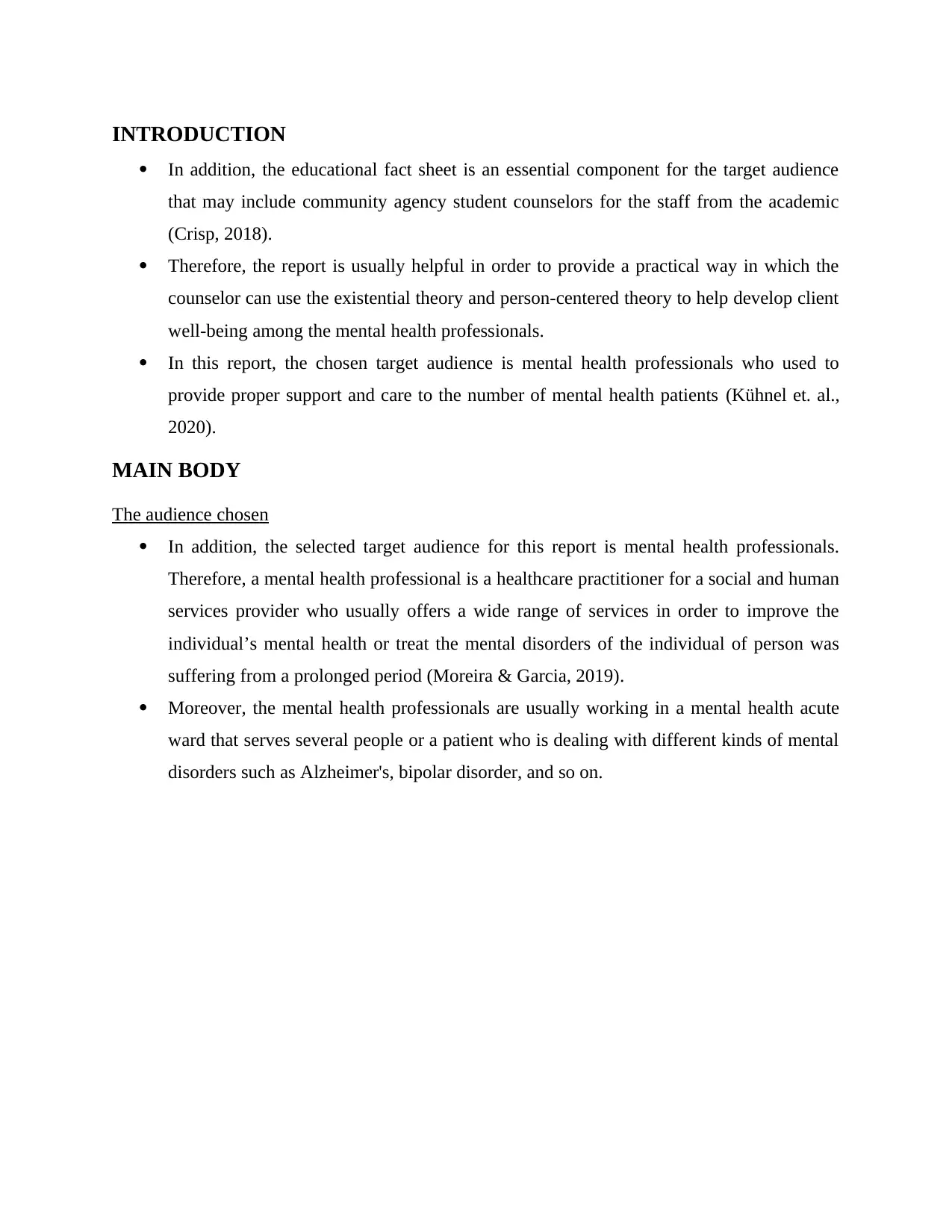
INTRODUCTION
In addition, the educational fact sheet is an essential component for the target audience
that may include community agency student counselors for the staff from the academic
(Crisp, 2018).
Therefore, the report is usually helpful in order to provide a practical way in which the
counselor can use the existential theory and person-centered theory to help develop client
well-being among the mental health professionals.
In this report, the chosen target audience is mental health professionals who used to
provide proper support and care to the number of mental health patients (Kühnel et. al.,
2020).
MAIN BODY
The audience chosen
In addition, the selected target audience for this report is mental health professionals.
Therefore, a mental health professional is a healthcare practitioner for a social and human
services provider who usually offers a wide range of services in order to improve the
individual’s mental health or treat the mental disorders of the individual of person was
suffering from a prolonged period (Moreira & Garcia, 2019).
Moreover, the mental health professionals are usually working in a mental health acute
ward that serves several people or a patient who is dealing with different kinds of mental
disorders such as Alzheimer's, bipolar disorder, and so on.
In addition, the educational fact sheet is an essential component for the target audience
that may include community agency student counselors for the staff from the academic
(Crisp, 2018).
Therefore, the report is usually helpful in order to provide a practical way in which the
counselor can use the existential theory and person-centered theory to help develop client
well-being among the mental health professionals.
In this report, the chosen target audience is mental health professionals who used to
provide proper support and care to the number of mental health patients (Kühnel et. al.,
2020).
MAIN BODY
The audience chosen
In addition, the selected target audience for this report is mental health professionals.
Therefore, a mental health professional is a healthcare practitioner for a social and human
services provider who usually offers a wide range of services in order to improve the
individual’s mental health or treat the mental disorders of the individual of person was
suffering from a prolonged period (Moreira & Garcia, 2019).
Moreover, the mental health professionals are usually working in a mental health acute
ward that serves several people or a patient who is dealing with different kinds of mental
disorders such as Alzheimer's, bipolar disorder, and so on.
⊘ This is a preview!⊘
Do you want full access?
Subscribe today to unlock all pages.

Trusted by 1+ million students worldwide
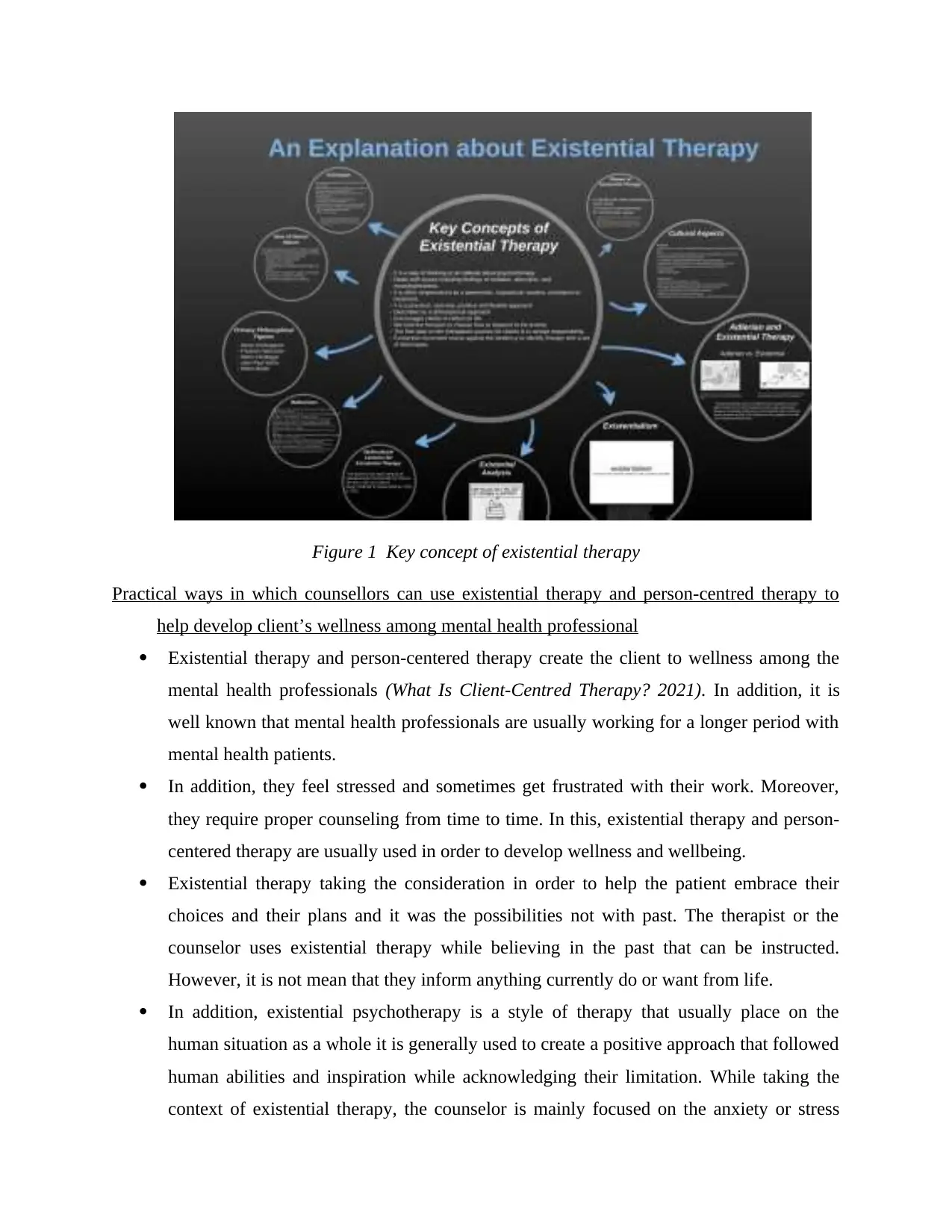
Figure 1 Key concept of existential therapy
Practical ways in which counsellors can use existential therapy and person-centred therapy to
help develop client’s wellness among mental health professional
Existential therapy and person-centered therapy create the client to wellness among the
mental health professionals (What Is Client-Centred Therapy? 2021). In addition, it is
well known that mental health professionals are usually working for a longer period with
mental health patients.
In addition, they feel stressed and sometimes get frustrated with their work. Moreover,
they require proper counseling from time to time. In this, existential therapy and person-
centered therapy are usually used in order to develop wellness and wellbeing.
Existential therapy taking the consideration in order to help the patient embrace their
choices and their plans and it was the possibilities not with past. The therapist or the
counselor uses existential therapy while believing in the past that can be instructed.
However, it is not mean that they inform anything currently do or want from life.
In addition, existential psychotherapy is a style of therapy that usually place on the
human situation as a whole it is generally used to create a positive approach that followed
human abilities and inspiration while acknowledging their limitation. While taking the
context of existential therapy, the counselor is mainly focused on the anxiety or stress
Practical ways in which counsellors can use existential therapy and person-centred therapy to
help develop client’s wellness among mental health professional
Existential therapy and person-centered therapy create the client to wellness among the
mental health professionals (What Is Client-Centred Therapy? 2021). In addition, it is
well known that mental health professionals are usually working for a longer period with
mental health patients.
In addition, they feel stressed and sometimes get frustrated with their work. Moreover,
they require proper counseling from time to time. In this, existential therapy and person-
centered therapy are usually used in order to develop wellness and wellbeing.
Existential therapy taking the consideration in order to help the patient embrace their
choices and their plans and it was the possibilities not with past. The therapist or the
counselor uses existential therapy while believing in the past that can be instructed.
However, it is not mean that they inform anything currently do or want from life.
In addition, existential psychotherapy is a style of therapy that usually place on the
human situation as a whole it is generally used to create a positive approach that followed
human abilities and inspiration while acknowledging their limitation. While taking the
context of existential therapy, the counselor is mainly focused on the anxiety or stress
Paraphrase This Document
Need a fresh take? Get an instant paraphrase of this document with our AI Paraphraser
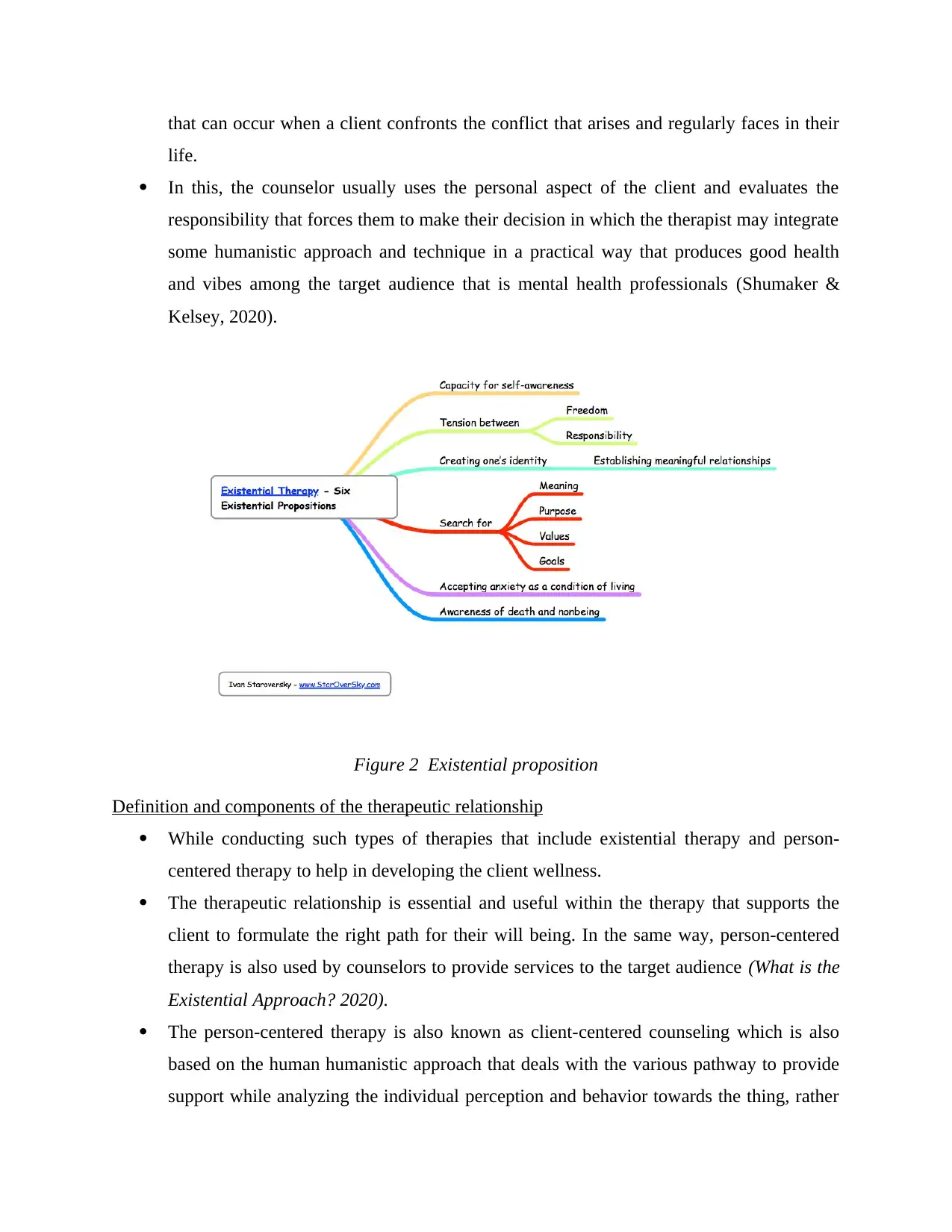
that can occur when a client confronts the conflict that arises and regularly faces in their
life.
In this, the counselor usually uses the personal aspect of the client and evaluates the
responsibility that forces them to make their decision in which the therapist may integrate
some humanistic approach and technique in a practical way that produces good health
and vibes among the target audience that is mental health professionals (Shumaker &
Kelsey, 2020).
Figure 2 Existential proposition
Definition and components of the therapeutic relationship
While conducting such types of therapies that include existential therapy and person-
centered therapy to help in developing the client wellness.
The therapeutic relationship is essential and useful within the therapy that supports the
client to formulate the right path for their will being. In the same way, person-centered
therapy is also used by counselors to provide services to the target audience (What is the
Existential Approach? 2020).
The person-centered therapy is also known as client-centered counseling which is also
based on the human humanistic approach that deals with the various pathway to provide
support while analyzing the individual perception and behavior towards the thing, rather
life.
In this, the counselor usually uses the personal aspect of the client and evaluates the
responsibility that forces them to make their decision in which the therapist may integrate
some humanistic approach and technique in a practical way that produces good health
and vibes among the target audience that is mental health professionals (Shumaker &
Kelsey, 2020).
Figure 2 Existential proposition
Definition and components of the therapeutic relationship
While conducting such types of therapies that include existential therapy and person-
centered therapy to help in developing the client wellness.
The therapeutic relationship is essential and useful within the therapy that supports the
client to formulate the right path for their will being. In the same way, person-centered
therapy is also used by counselors to provide services to the target audience (What is the
Existential Approach? 2020).
The person-centered therapy is also known as client-centered counseling which is also
based on the human humanistic approach that deals with the various pathway to provide
support while analyzing the individual perception and behavior towards the thing, rather
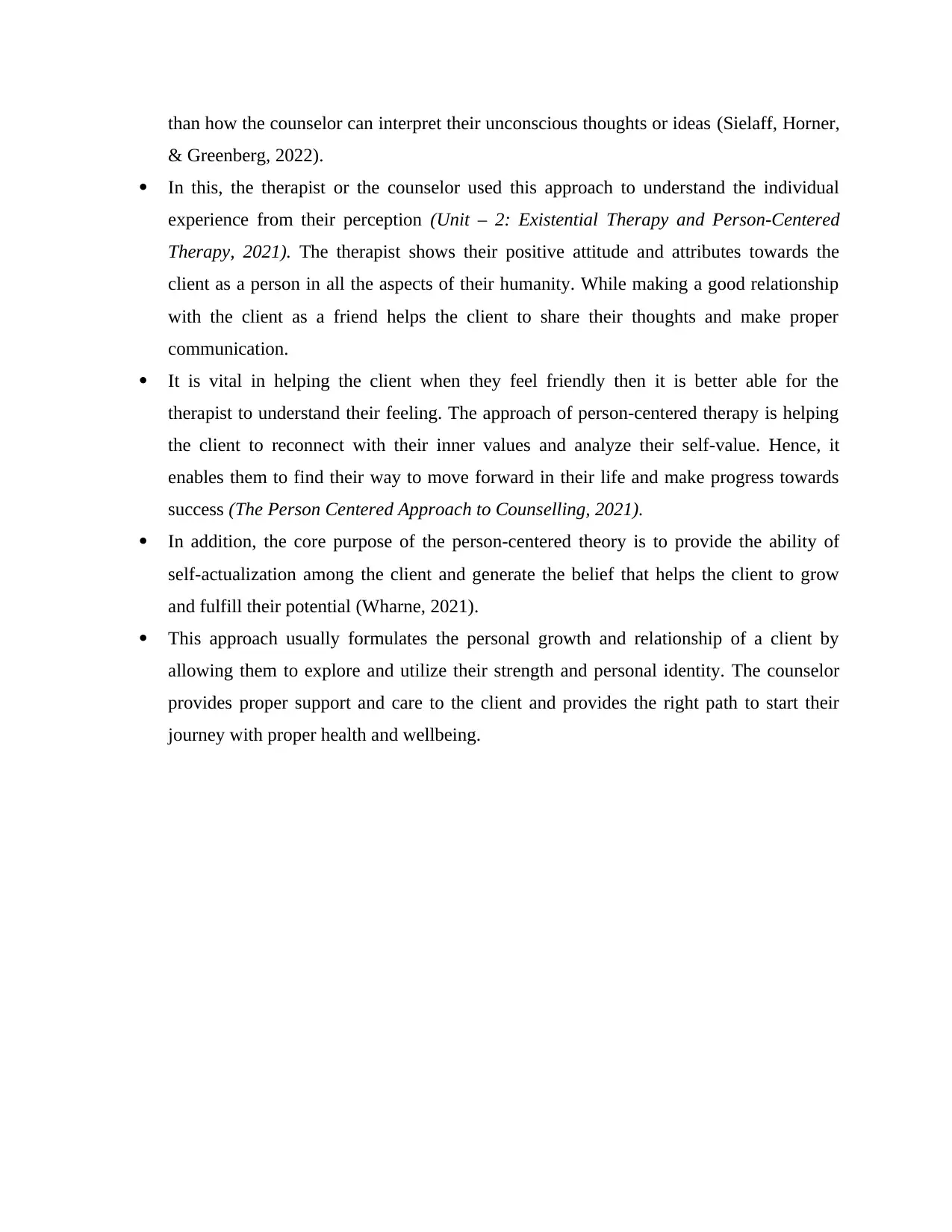
than how the counselor can interpret their unconscious thoughts or ideas (Sielaff, Horner,
& Greenberg, 2022).
In this, the therapist or the counselor used this approach to understand the individual
experience from their perception (Unit – 2: Existential Therapy and Person-Centered
Therapy, 2021). The therapist shows their positive attitude and attributes towards the
client as a person in all the aspects of their humanity. While making a good relationship
with the client as a friend helps the client to share their thoughts and make proper
communication.
It is vital in helping the client when they feel friendly then it is better able for the
therapist to understand their feeling. The approach of person-centered therapy is helping
the client to reconnect with their inner values and analyze their self-value. Hence, it
enables them to find their way to move forward in their life and make progress towards
success (The Person Centered Approach to Counselling, 2021).
In addition, the core purpose of the person-centered theory is to provide the ability of
self-actualization among the client and generate the belief that helps the client to grow
and fulfill their potential (Wharne, 2021).
This approach usually formulates the personal growth and relationship of a client by
allowing them to explore and utilize their strength and personal identity. The counselor
provides proper support and care to the client and provides the right path to start their
journey with proper health and wellbeing.
& Greenberg, 2022).
In this, the therapist or the counselor used this approach to understand the individual
experience from their perception (Unit – 2: Existential Therapy and Person-Centered
Therapy, 2021). The therapist shows their positive attitude and attributes towards the
client as a person in all the aspects of their humanity. While making a good relationship
with the client as a friend helps the client to share their thoughts and make proper
communication.
It is vital in helping the client when they feel friendly then it is better able for the
therapist to understand their feeling. The approach of person-centered therapy is helping
the client to reconnect with their inner values and analyze their self-value. Hence, it
enables them to find their way to move forward in their life and make progress towards
success (The Person Centered Approach to Counselling, 2021).
In addition, the core purpose of the person-centered theory is to provide the ability of
self-actualization among the client and generate the belief that helps the client to grow
and fulfill their potential (Wharne, 2021).
This approach usually formulates the personal growth and relationship of a client by
allowing them to explore and utilize their strength and personal identity. The counselor
provides proper support and care to the client and provides the right path to start their
journey with proper health and wellbeing.
⊘ This is a preview!⊘
Do you want full access?
Subscribe today to unlock all pages.

Trusted by 1+ million students worldwide
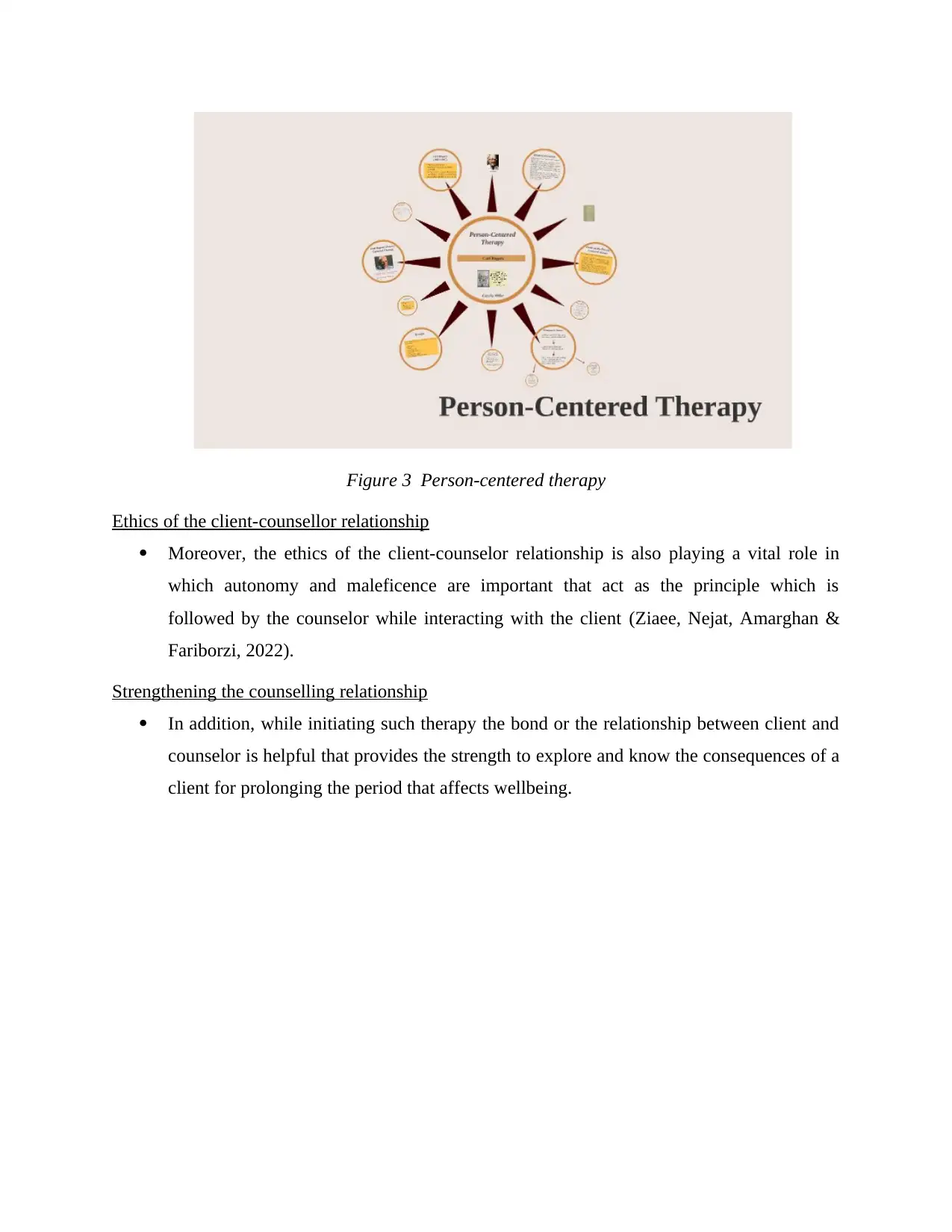
Figure 3 Person-centered therapy
Ethics of the client-counsellor relationship
Moreover, the ethics of the client-counselor relationship is also playing a vital role in
which autonomy and maleficence are important that act as the principle which is
followed by the counselor while interacting with the client (Ziaee, Nejat, Amarghan &
Fariborzi, 2022).
Strengthening the counselling relationship
In addition, while initiating such therapy the bond or the relationship between client and
counselor is helpful that provides the strength to explore and know the consequences of a
client for prolonging the period that affects wellbeing.
Ethics of the client-counsellor relationship
Moreover, the ethics of the client-counselor relationship is also playing a vital role in
which autonomy and maleficence are important that act as the principle which is
followed by the counselor while interacting with the client (Ziaee, Nejat, Amarghan &
Fariborzi, 2022).
Strengthening the counselling relationship
In addition, while initiating such therapy the bond or the relationship between client and
counselor is helpful that provides the strength to explore and know the consequences of a
client for prolonging the period that affects wellbeing.
Paraphrase This Document
Need a fresh take? Get an instant paraphrase of this document with our AI Paraphraser
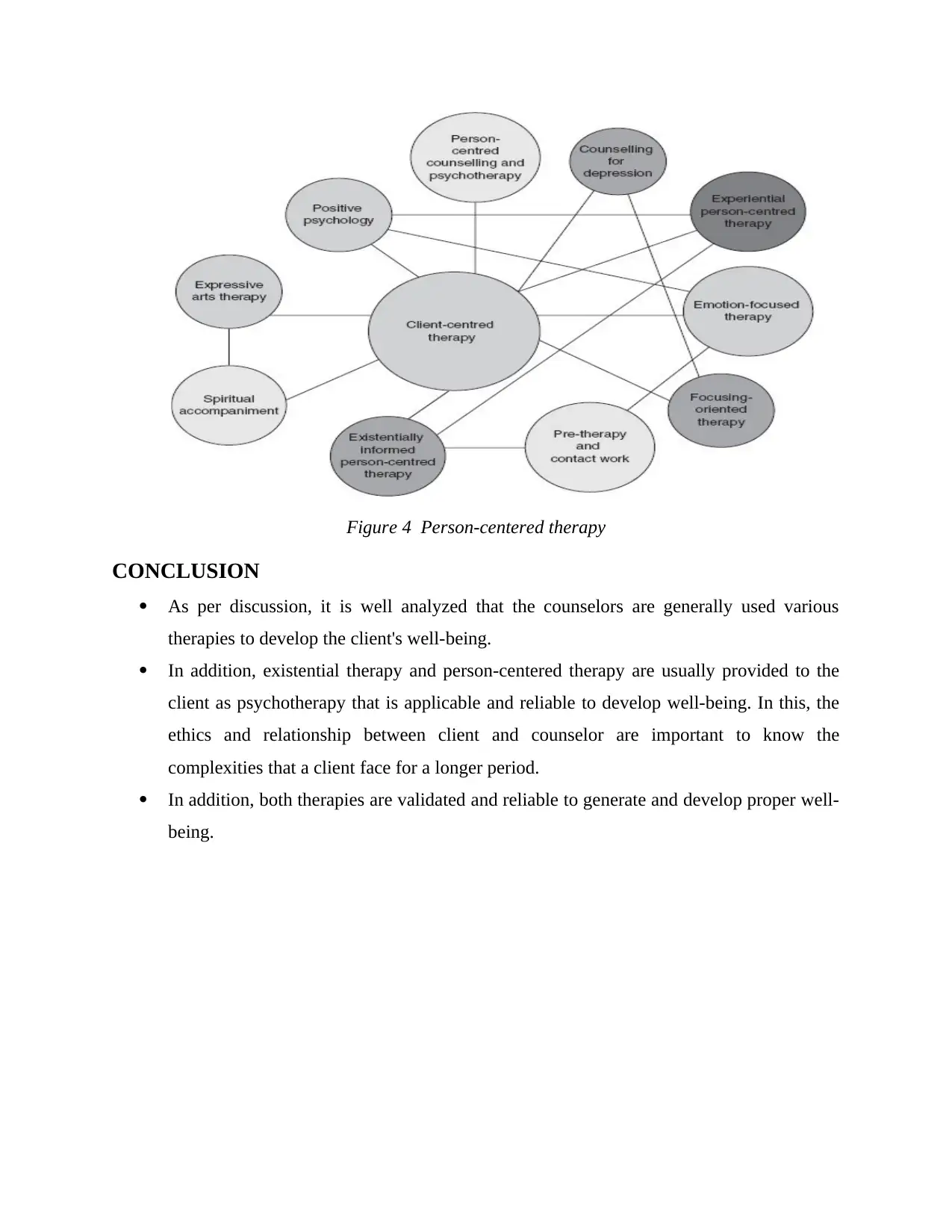
Figure 4 Person-centered therapy
CONCLUSION
As per discussion, it is well analyzed that the counselors are generally used various
therapies to develop the client's well-being.
In addition, existential therapy and person-centered therapy are usually provided to the
client as psychotherapy that is applicable and reliable to develop well-being. In this, the
ethics and relationship between client and counselor are important to know the
complexities that a client face for a longer period.
In addition, both therapies are validated and reliable to generate and develop proper well-
being.
CONCLUSION
As per discussion, it is well analyzed that the counselors are generally used various
therapies to develop the client's well-being.
In addition, existential therapy and person-centered therapy are usually provided to the
client as psychotherapy that is applicable and reliable to develop well-being. In this, the
ethics and relationship between client and counselor are important to know the
complexities that a client face for a longer period.
In addition, both therapies are validated and reliable to generate and develop proper well-
being.
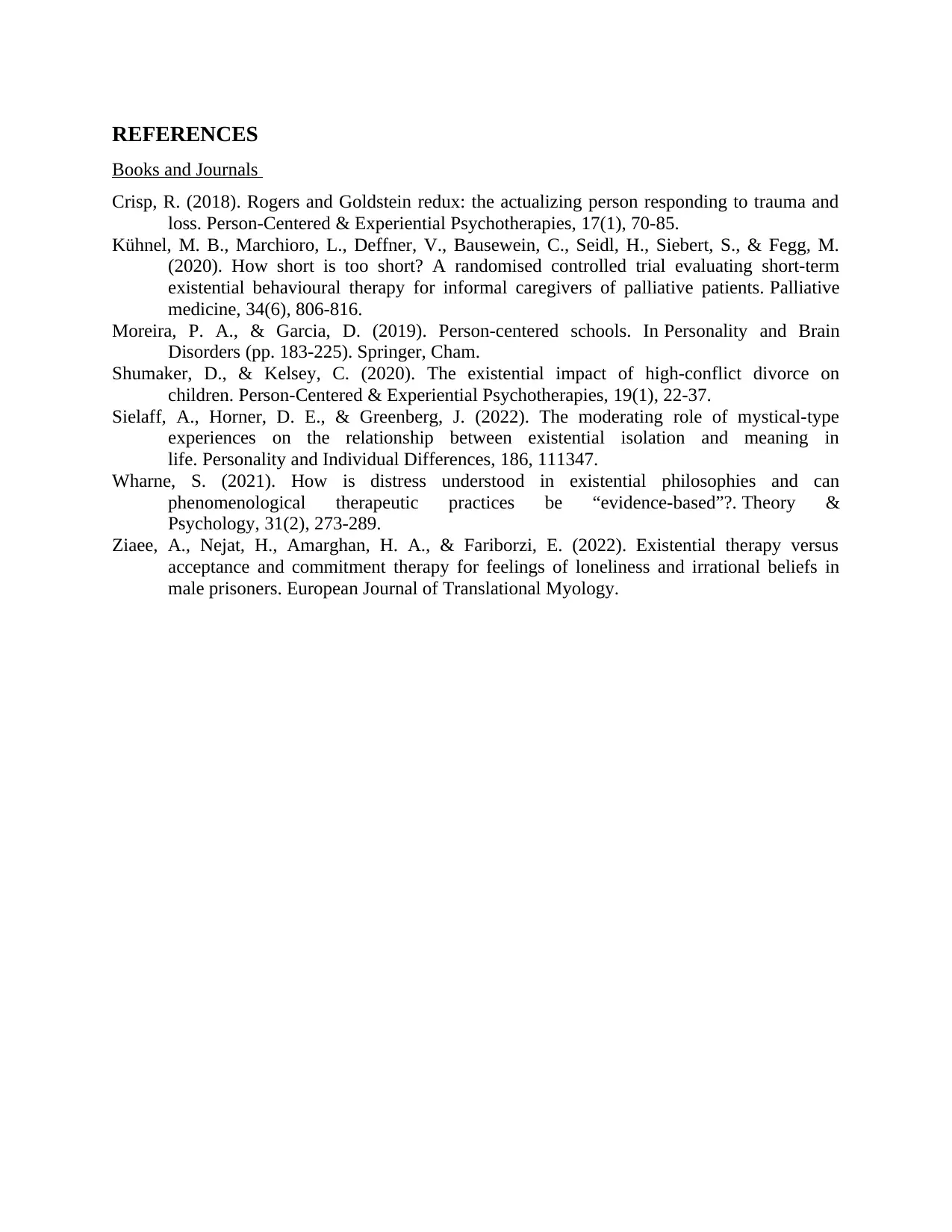
REFERENCES
Books and Journals
Crisp, R. (2018). Rogers and Goldstein redux: the actualizing person responding to trauma and
loss. Person-Centered & Experiential Psychotherapies, 17(1), 70-85.
Kühnel, M. B., Marchioro, L., Deffner, V., Bausewein, C., Seidl, H., Siebert, S., & Fegg, M.
(2020). How short is too short? A randomised controlled trial evaluating short-term
existential behavioural therapy for informal caregivers of palliative patients. Palliative
medicine, 34(6), 806-816.
Moreira, P. A., & Garcia, D. (2019). Person-centered schools. In Personality and Brain
Disorders (pp. 183-225). Springer, Cham.
Shumaker, D., & Kelsey, C. (2020). The existential impact of high-conflict divorce on
children. Person-Centered & Experiential Psychotherapies, 19(1), 22-37.
Sielaff, A., Horner, D. E., & Greenberg, J. (2022). The moderating role of mystical-type
experiences on the relationship between existential isolation and meaning in
life. Personality and Individual Differences, 186, 111347.
Wharne, S. (2021). How is distress understood in existential philosophies and can
phenomenological therapeutic practices be “evidence-based”?. Theory &
Psychology, 31(2), 273-289.
Ziaee, A., Nejat, H., Amarghan, H. A., & Fariborzi, E. (2022). Existential therapy versus
acceptance and commitment therapy for feelings of loneliness and irrational beliefs in
male prisoners. European Journal of Translational Myology.
Books and Journals
Crisp, R. (2018). Rogers and Goldstein redux: the actualizing person responding to trauma and
loss. Person-Centered & Experiential Psychotherapies, 17(1), 70-85.
Kühnel, M. B., Marchioro, L., Deffner, V., Bausewein, C., Seidl, H., Siebert, S., & Fegg, M.
(2020). How short is too short? A randomised controlled trial evaluating short-term
existential behavioural therapy for informal caregivers of palliative patients. Palliative
medicine, 34(6), 806-816.
Moreira, P. A., & Garcia, D. (2019). Person-centered schools. In Personality and Brain
Disorders (pp. 183-225). Springer, Cham.
Shumaker, D., & Kelsey, C. (2020). The existential impact of high-conflict divorce on
children. Person-Centered & Experiential Psychotherapies, 19(1), 22-37.
Sielaff, A., Horner, D. E., & Greenberg, J. (2022). The moderating role of mystical-type
experiences on the relationship between existential isolation and meaning in
life. Personality and Individual Differences, 186, 111347.
Wharne, S. (2021). How is distress understood in existential philosophies and can
phenomenological therapeutic practices be “evidence-based”?. Theory &
Psychology, 31(2), 273-289.
Ziaee, A., Nejat, H., Amarghan, H. A., & Fariborzi, E. (2022). Existential therapy versus
acceptance and commitment therapy for feelings of loneliness and irrational beliefs in
male prisoners. European Journal of Translational Myology.
⊘ This is a preview!⊘
Do you want full access?
Subscribe today to unlock all pages.

Trusted by 1+ million students worldwide
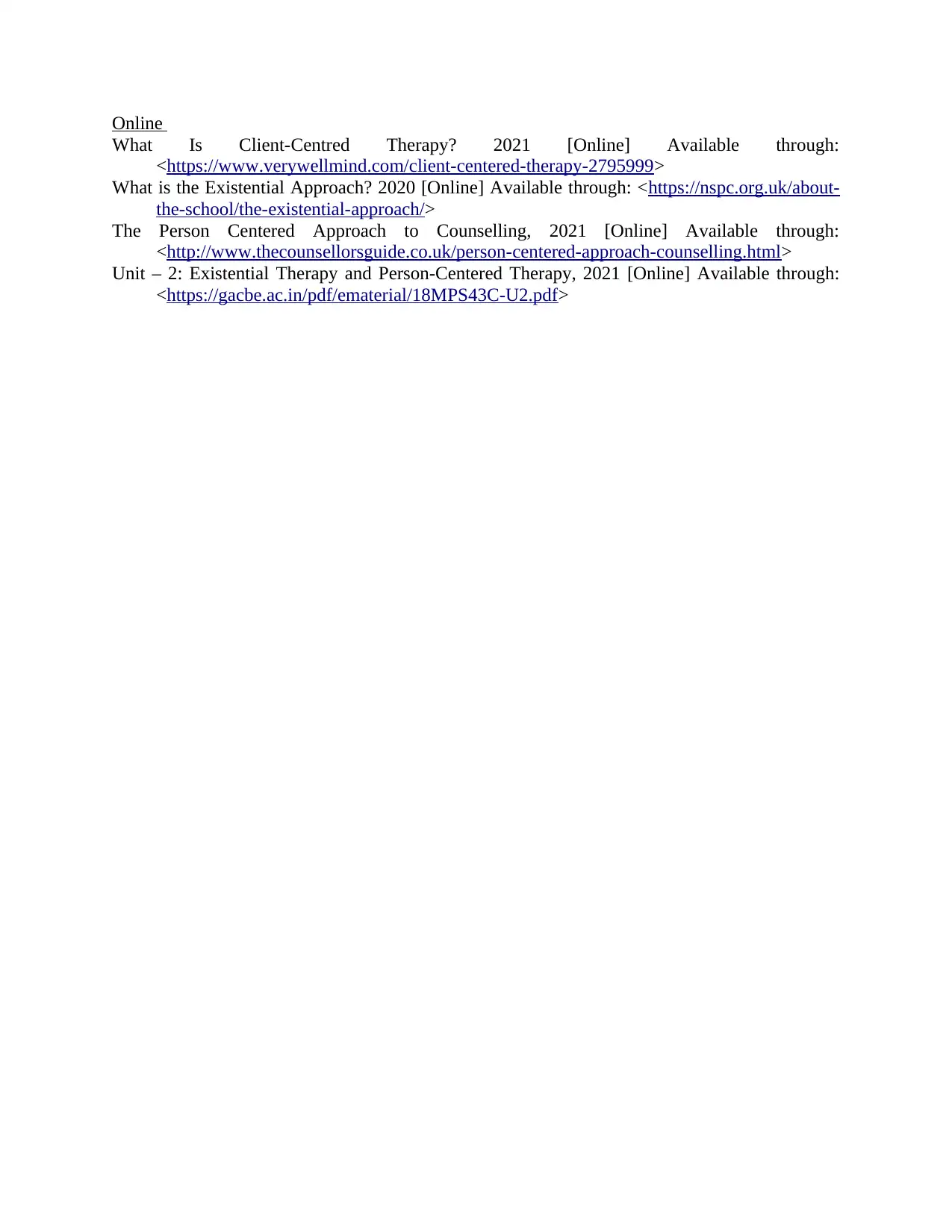
Online
What Is Client-Centred Therapy? 2021 [Online] Available through:
<https://www.verywellmind.com/client-centered-therapy-2795999>
What is the Existential Approach? 2020 [Online] Available through: <https://nspc.org.uk/about-
the-school/the-existential-approach/>
The Person Centered Approach to Counselling, 2021 [Online] Available through:
<http://www.thecounsellorsguide.co.uk/person-centered-approach-counselling.html>
Unit – 2: Existential Therapy and Person-Centered Therapy, 2021 [Online] Available through:
<https://gacbe.ac.in/pdf/ematerial/18MPS43C-U2.pdf>
What Is Client-Centred Therapy? 2021 [Online] Available through:
<https://www.verywellmind.com/client-centered-therapy-2795999>
What is the Existential Approach? 2020 [Online] Available through: <https://nspc.org.uk/about-
the-school/the-existential-approach/>
The Person Centered Approach to Counselling, 2021 [Online] Available through:
<http://www.thecounsellorsguide.co.uk/person-centered-approach-counselling.html>
Unit – 2: Existential Therapy and Person-Centered Therapy, 2021 [Online] Available through:
<https://gacbe.ac.in/pdf/ematerial/18MPS43C-U2.pdf>
1 out of 10
Related Documents
Your All-in-One AI-Powered Toolkit for Academic Success.
+13062052269
info@desklib.com
Available 24*7 on WhatsApp / Email
![[object Object]](/_next/static/media/star-bottom.7253800d.svg)
Unlock your academic potential
Copyright © 2020–2026 A2Z Services. All Rights Reserved. Developed and managed by ZUCOL.





